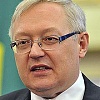Moscow looks forward to detailed discussions of the Trans-Pacific Partnership (TPP) agreement at the G20 summit in Turkey's Antalya on Nov. 15-16 and hopes to see the text of the deal, Russian Deputy Foreign Minister Sergey Ryabkov told TASS on Monday.
"The undermining of the WTO [World Trade Organization] is the source of serious worries for us," the diplomat said.
"We believe that the United States, which initiated work on the TPP formation, did so in the non-transparent way, without not only a due and simple involvement, but without informing about it other key centers of the economic force [Russia and China]."
"They in fact took the same path as they take in the sphere of security. In other words it is an approach of a bloc, of an alliance, where there are guiders and those guided, where decisions are in fact dictated from one center."
The Russian deputy foreign minister said that this scheme is used by such countries as the United States which used to state that "the freedom of market must be the basis for the economic development and promotion of international economic relations."
"However, they are contradicting themselves by implementing closed and non-transparent schemes," Ryabkov said. "This is nothing but a blatant double standard."
"We will be seeking that the content of the agreement on the Trans-Pacific Partnership would be provided to us in subject, detail and without omissions," Ryabkov said. "I believe and even expect that the issue of forming the Trans-Pacific Partnership would be one of the issues, probably the top ones, to be discussed at the upcoming G20 summit in Antalya on Nov.15 to 16."
In his first comments on the TPP agreement concluded on October 5, 2015, US President Barack Obama said: "When more than 95% of our potential customers live outside our borders, we can't let countries like China write the rules of the global economy."
Alongside the United States the other members of the TPP are Japan, New Zealand, Australia, Brunei, Canada, Chile, Malaysia, Mexico, Peru, Singapore and Vietnam. These countries account for 40 percent implies elimination of all duties on goods and services and creation of a free trade zone in the Asia-Pacific Region.
In Nov. last year, Russian President Putin said the Trans-Pacific Partnership without Russia and China would be ineffective.
And in his address to the 70th UN General Assembly session Putin said a number of countries opted for creating exclusive economic associations closed to outsiders.
This is fraught with utter imbalance of the trading system and the fragmentation of the global economic space, he warned.
Source: TASS




